










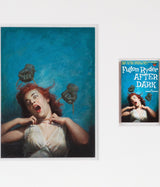
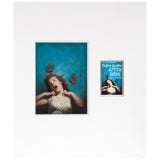
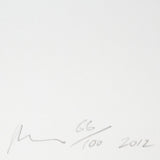
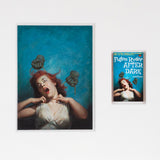
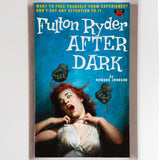
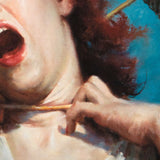
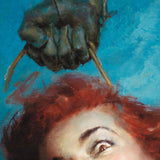
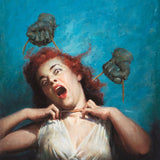
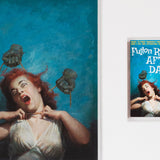
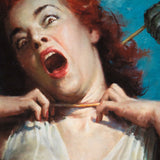

Richard Prince
RICHARD PRINCE "FULTON RYDER AFTER DARK" 2012
Richard Prince (b. 1949) is one of the most innovative and polemic American artists. Whether you associate him with The Pictures Generation, Post-Modernism, or appropriation art, his contribution is undeniable.
Prince has worked in a variety of formats over the course of his career, yet each of his series shares a similar approach: extract an element from America's visual culture and elevate it similar to Duchamp's urinal.
Prince's key ingredients come through mass media. Whether it's nurses from the covers of pulp fiction novels, macho cowboys in Marlboro ads, or supermodel selfies, Prince reflects and subverts the gauntlet of American imagery.
Prince is an avid book collector and bibliophile, owning a massive collection of American postwar literature. He began appropriating pulp fiction paperback covers with his "Nurse" series first exhibited in 2003. Prince would scan the cover of pulp paperbacks, transfer them to canvas and paint, collage, and/or otherwise modify the covers. "Nurses" enhanced and subverted female nurses as a rampant source of fetishized sexual objectification in American adult pulp fiction.
In "Fulton Ryder After Dark", Prince continues to confront prevalent depictions of forbidden sexuality seen through the male gaze. The work consists of two images side by side in a diptych style.
On the right is a smaller image containing the (modified) cover of a novel "Fulton Ryder After Dark", while on the left is the enlarged painting originally used for the cover devoid of any text. The book cover titled "Fulton Ryder After Dark" is clearly from the retro-horror genre of pulp fiction, featuring a mysterious pair of floating hands ominously emerging from a blue background and violently strangling a woman. Dressed in a low cut white silk night gown with fiery red hair, the woman's face contains a dramatic expression of horror and shock at her ghastly situation. Above the image on the parody book cover, is a faux tagline reading "Want to free yourself from experience? Don't pay any attention to it."
Although somewhat violent and frightening, the imagery maintains the distinct style of pulp fiction paperback covers, which often employed tawdry or shocking imagery to capture interest. Prince's work seeks to expose the inner forces of desire and power, especially as they relate to identity and gender constructs.
Over the years Prince developed this easily identifiable and frequently employed layout of pairing two (and sometimes more) related images, a smaller image next to a larger one. This visual pairing exposes his taxonomical approach to appropriation and contextualization.
Much like the two images would be paired together in a museum display case or scrap-book, Prince pairs them together under his own authorship. Cheekily, he incorporates his own pseudonym of Fulton Ryder into the cover, formally stamping this "diptych" as his own.
Fulton Ryder is a pseudonym of Prince's which he uses in various contexts, most recently his handle on instagram. It was also the name of his secretive book store on New York's Upper East Side which held gallery-like exhibitions, but closed down in 2014. Books, and the cover art that defines them, play a significant role in Prince's oeuvre and personal life.
"Fulton Ryder After Dark" exemplifies Prince's subversive appropriation in his immediately recognizable format.
Questions about this piece? Contact us or call 1.416.704.1720
"Fulton Ryder After Dark"
USA, 2012
Offset lithograph in colors on wove paper
Signed, numbered, and dated in pencil lower right
From an edition of 100
30"H 26"W (work)
Excellent condition.
Literature: Jonathan Lethem, Richard Prince: Collected Writings, 2011.
- Where does the inventory ship from?
Our inventory is divided between New York and Toronto.
- Where do you ship to?
We can ship anywhere. Typically when we ship within North America we prefer to use FedEx or DHL. To Europe, Asia and beyond we generally use DHL.
- How much does it cost to ship?
For shipments within North America, we typically charge a flat rate fee. Many items on our site will list the rate. For shipping outside of North America, we can easily provide a quote and will look for the most efficient and economical option.
Most of the items on our site can be easily shipped internationally.
Occasionally we will recommend that an artwork be removed from its frame for shipping. Larger framed works are typically framed with plexiglass. We export over 80% of what we sell, so we are comfortable shipping anywhere.
- Are there additional taxes or fees?
When a work is valued above $2,500 usd there is a possibility of tax of 0.35%, but this is applied sporadically. There can similarly be an additional fee for customs brokerage and this can range from $20 - $65. US Taxes, duties and customs brokerage are not included in our flat rate shipping. However most of our shipments to the US enter without any additional fees.
- Do you provide a certificate of authenticity?
Yes, we guarantee everything we sell. We can provide both a digital and printed version of our certificate of authenticity.
What is your return policy?
- Caviar20 wants you to be 100% satisfied with your purchase. We have a 7 day no-questions full refund return policy for your purchase. Shipping charges are non-refundable. Return shipping is the responsibility of the customer. After 8 days returns are given a credit note. There is no expiration for our credit notes.
- What payment methods do you accept?
Canadian clients are welcomed and encouraged to pay with interac.
